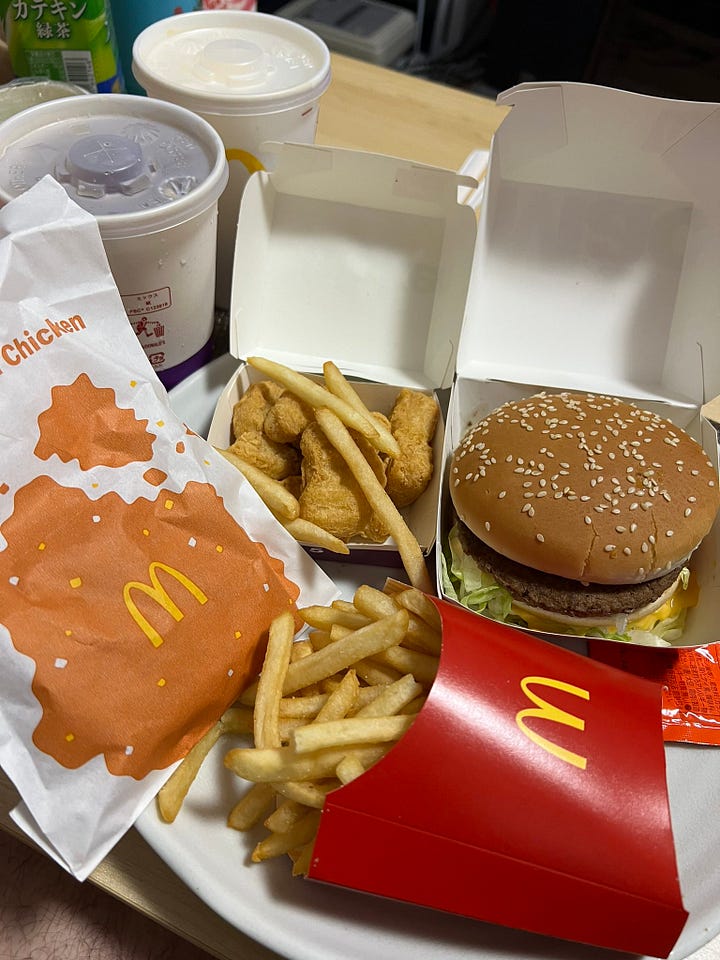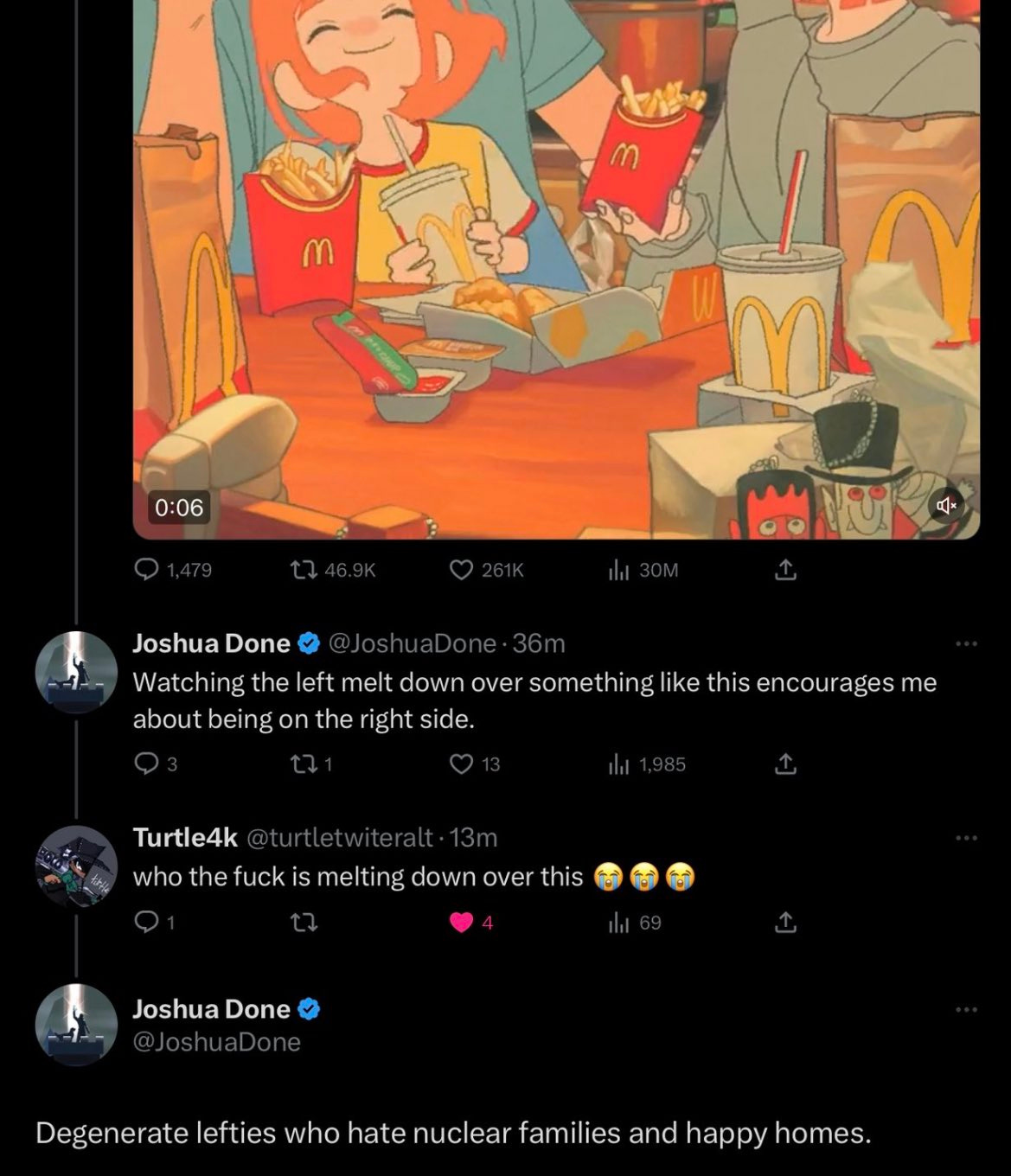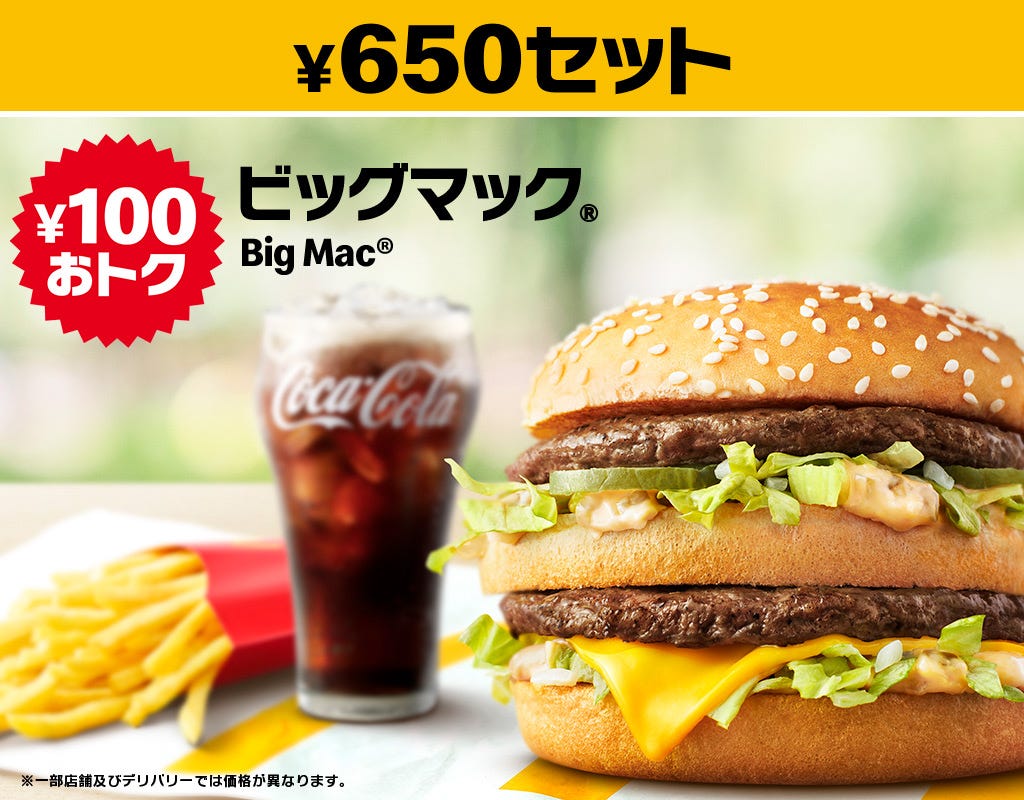That Japanese McDonald's Advertisement is No Big Deal
Plus an aside on why the food is better than American McDonald's.
As Gearoid Reidy of Bloomberg pointed out, one can only imagine what must be going through the head of whoever is in charge of the McDonald’s Japan Twitter account now.
On Sept. 20, the Japanese branch of the famous American burger chain posted a tweet showing a family enjoying a meal as part of its promotion for a chicken nugget French fry combo which is popular over here in the evenings. Translated, the text reads “It’s nothing special, just a happy time.”
The wholesome imagery and charming anime artwork by Urachan proved to be an instant hit, probably far more than McDonald’s Japan ever could have imagined. It’s currently going viral among international audiences, but for reasons far beyond the original intentions of either the brand or the artist.
Within a day of the tweet, Western accounts (many who are mutual followers with me) praised the ad for supposedly promoting the nuclear family model, compared it to former prime minister Shinzo Abe’s push for Japanese people to have more children, and contrasted it with social justicey ads previously posted by the American version of McDonald’s.
Not even realizing this discourse was happening at the time, I myself tweeted about how the culture around Japanese McDonald’s is notably different from that of McDonald’s in the United States, leading to a viral post which unintentionally added even more fuel to the fire. As to be expected from the wonderful dumpster fire of a site that is Twitter, certain people sent rather colorful comments my way and went as far to call me an “Asian fetishizer,” which is a rather odd thing to say to someone who is Asian.
But is there really some deeper meaning here to what’s happening? Is McDonald’s Japan subliminally trying to get its customers to reproduce more via the power of burgers and fries? The answer to me appears to be no, and this controversy just seems to be another attempt at trying to pull Japan into American-style culture wars it has nothing to do with.
It’s first necessary to point out how McDonald’s is generally viewed in Japan to provide some context for that viral advertisement.
Entrepreneur Den Fujita established the first Japanese McDonald’s in 1971 to give his fellow countrymen a slice of Americana as the country was becoming an economic powerhouse in the decades since WWII. Having also been responsible for introducing Toys “R” Us and Blockbuster to Japan, Fujita was an eccentric businessman who wanted to provide fun and amusement to families.
McDonald’s investors initially expressed concerns over how successful burgers and fries would be in an Asian country that typically prefers rice over bread, but Fujita’s smart marketing and adaption to local Japanese tastes with exclusive menu items made the Golden Arches a massive hit in the Land of the Rising Sun. The rest, as they say, is history, and McDonald’s continues to be the top fast food franchise in Japan with nearly 3,000 stores in operation. This makes Japan the most successful country for McDonald’s outside of the United States.
Going to McDonald’s in Japan is an experience I always look forward to. The meals are usually fresh and while still fast food at the end of the day, the chain offers a consistent level of quality which is in sharp contrast to how it typically is in the United States. Chances are much higher here that your burger is going to actually look like how it’s advertised. As expected of Japanese service, the staff are trained to be alert and friendly with customers, which means interacting with them is almost always pleasant. The restaurants themselves are very spacious and clean, which makes them surprisingly ideal places for long study sessions. It’s very common to see large groups of Japanese teenagers studiously working on homework or preparing for exams as they munch away on fries or have a coffee with their friends.
Pointing this out on Twitter mostly resulted in people agreeing with me, but inevitably other replies and quote retweets were the same “Place, Japan” meme being spammed over and over again. On one hand, I sort of get it. There are weeaboos who overly idealize Japan, but at the same time I think the opposing crowd who are constantly cynical are just as inaccurate with their assessments. In this specific case, McDonald’s Japan is a culturally distinct experience from its American counterpart and it isn’t a stretch to say that it’s objectively a better one.
Unlike in the States, McDonald’s Japan is also still keeping its menu items relatively cheap and affordable for the average consumer. This month I ordered a Big Mac medium set, a five-piece chicken nuggets box, a piece of Shaka chicken (a Japan-exclusive exclusive item), and a medium milkshake for ¥1450. That’s about $9.80 USD altogether, which in the current American economy would be considered the average price for just the Big Mac set.


This brings us to the original topic of discussion, that wholesome Twitter advertisement. Just as Den Fujita envisioned over 50 years ago, McDonald’s Japan is aimed at a wide audience of consumers, particularly families. Much of the brand’s marketing has strongly featured this theme, resulting in plenty of emotionally moving advertisements such as this one from 2022 featuring a father and daughter who bond over the food. The slogan “Together with family” also regularly appears in McDonald’s commercials.
With that background, the Twitter advertisement is hardly anything original or particularly noteworthy for the brand. Sure, it features eye-catching anime artwork, but McDonald’s Japan has done entire animated short films as marketing tools for attracting new staff. While some are making dubious connections to the fast food chain trying to promote reproduction amid Japan’s worrying demographic problems, this ignores the fact that McDonald’s Japan has always promoted family since its inception. Go back to the 1970s and the commercials covered the same ground long before Japanese politicians were expressing concerns over the country’s shrinking population.
A consistent uninformed hot take I’ve been seeing is that while Japanese McDonald’s is promoting family with its marketing, its Western counterparts are excluding this messaging because such values are supposedly no longer relevant in our decadent last-days-of-Rome era. But is this really the case?
A look at the McDonald’s USA YouTube channel shows a recent commercial depicting a happy African-American family going to the restaurant. McDonald’s UK has a cute advertisement showing multiple families in traffic all excited to visit the burger chain. McDonald’s Canada? A touching video promoting how the brand helped a family whose child was diagnosed with leukemia. While I do think that the Japanese McDonald’s ads are ultimately superior (come on, this country has always been the king of amazing commercials), I just don’t buy the idea that the other versions of McDonald’s across the globe are somehow more adverse to happy families.

Many are citing the “stop killing black trans women” tweet as a sign that McDonald’s in the U.S. has gone irreversibly woke, but that isn’t the whole story either. While I do think it was out of place compared to the rest of the company’s typical messaging, bear in mind that this was at the height of the 2020 virtue signaling hysteria over George Floyd’s death that virtually every brand participated in, including several international companies. Apart from that one time, the U.S. McDonald’s Twitter account hasn’t posted any notable statements on political or social issues that I could find via a keyword search. The American brand’s social media now largely just sticks to rather droll and harmless content.
But again, what about the supposed “controversy” with the Japanese McDonald’s tweet? People on the right say that leftists are “seething” over the ad because it allegedly “promotes the traditional nuclear family,” but I’ve searched high and low for any kind of real progressive backlash and couldn’t find any. I’ve seen plenty of conservatives claiming that leftists are angry, but actual left-wing accounts are just finding the whole premise absurd.
I can only come to the conclusion that like with so many things on Twitter, this entire controversy is simply a manufactured narrative where people are fighting windmills in yet another terminally online culture war. The fact that some seriously think the Japanese tweet features a white family just tells me that many of these takes are coming from a place of pure ignorance. We’ve already established that McDonald’s Japan has branded itself as a family restaurant for decades long before the country’s demographic woes and that its Western counterparts have done the same.
And herein lies the main problem I see with this discourse. Westerners, but mostly Americans, are trying to project their own beliefs and insecurities onto a country that is completely divorced from these culture wars. Whatever Japanese executive commissioned that advertisement for artist Urachan to draw clearly did not have any kind of political or social agenda in mind. It was simply a piece of marketing consistent with what McDonald’s Japan has done for decades, but foreign Twitter users unaware of that context ended up making a mountain out of a molehill.

I find it a shame that an innocent piece of cute artwork is igniting such volatile discussion that’s well beyond its intended purpose. The bizarrely hostile replies to my tweet about Japanese McDonald’s being better than the American version when I was just talking about food illustrate how Twitter in the Anglosphere is run on so much negativity and constant cynicism. I’m used to it as someone who has been on the platform for over ten years and maintains a moderately decent following, but certain grifters know exactly what they’re doing because intentionally antagonistic posts are how they create clout.
The stuff that Westerners on Twitter constantly argue about such as J.K. Rowling’s name being attached to Hogwarts Legacy or selectable pronouns being a feature in Bethesda’s space role-playing game Starfield are typically not things that Japanese people are aware of. But I think that the McDonald’s advertisement is an even dumber vessel for controversy and hardly something that should be igniting days or weeks of heated discussion as being symbolic of Western civilization ending.
Sometimes a commercial with good aesthetics trying to sell you fast food really is just a commercial with good aesthetics trying to sell you fast food. I’ll take the Big Mac set to go, please.









Are you saying this whole situation is a nothingburger?
“Awesome, you’re taking a stand for the nuclear family!”
“Sir, this is a McDonald’s.”